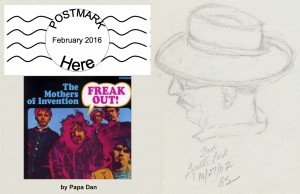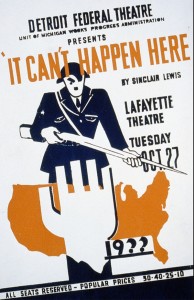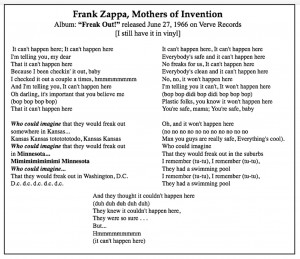It Can’t Happen Here

“Those who cannot remember the past are doomed to repeat it.”
— George Santayana
“I’ve got news for Mr. Santayana: we’re doomed to repeat the past no matter what. That’s what it is to be alive.”
— Kurt Vonnegut
Naw, Can’t Happen, Not Here
Now that we are within the last month of the 2016 election, I couldn’t resist the impulse to renew a “warning” that was written back in 1935. The temptation to write about the election has been strong. So, back in January, in the early days of the primary season, I wrote a column about the future of the Democratic Party. At the end of it, I cited a column by David Brooks about the future of the Republican Party. You probably noticed that neither of these were actually about the candidates; they are about a larger question about our political process. After posting that piece, I sat down to watch a series of interviews in which people who had attended the last Republican debate were asked what attracted them to the various candidates.
As I listened to what they liked about Donald Trump, it occurred to me that I had heard some of those messages before. Some wore hats that repeated his theme, ”Let’s make American great again.” They liked the fact that he wanted American to win more often – “We don’t win anymore. When I am president, we are going to win!” They cited his desire to restore what he considered “traditional American values” like order and corporate prosperity (“If we strengthen American corporations to they will bring profits back home”). They resonated with his interest in building a wall to keep them out but because they are coming here to do us harm. He blamed an incompetent and weak government in Washington, especially the Congress, for most of our troubles. They liked is plan to destroy our enemies. How? “We’ll carpet bomb them all,” he said. That all sounded familiar; I recalled hearing that somewhere before. But where?
And then I remembered.
For a high school book report, I read a novel recommended to me by my English teacher in 1966. It Can’t Happen Here is a 1935 novel by Sinclair Lewis, published during the rise of fascism in Europe. Let’s travel back to the world of that novel and see what happens, in the world of fiction, of course, when a fearful America elects an extreme charismatic corporate leader in a time of crisis.
An update –> Just this past week, four of us attended the stage adaptation of that novel at the Berkeley Repertory Theater. Although this play only slightly modified the details from the way the story was written in 1935, it was frightening in its similarity to the issues, characters, and divisions among Americans that we know so well in this 2016 election campaign. The story is a reminder — OK a warning — of what is at stake in this election. The play runs through November 6 (yes, two days before our own election day); so if you are interested, there is still time to see it. Here is my synopsis:
Back in time to the world of the novel
The novel describes the rise of Berzelius “Buzz” Windrip, a charismatic and power-hungry politician (patterned after an extreme corporate leader of the time). In the novel, Windrip runs for president of the United States and easily defeats Senator Walt Trowbridge and Franklin Delano Roosevelt, promising to restore the country to its former greatness and prosperity. He portrays himself as a champion of traditional American values. Foreshadowing some authoritarian measures that would emerge in the the fascist nations of Europe, Windrip reorganizes the US government — he rapidly outlaws dissent, arrests political enemies, and trains and arms a paramilitary force called the Minute Men, who terrorize citizens and enforce the policies of his “corporatist” regime. One of his first acts as president is to eliminate the influence of an ineffective Congress, which draws the ire of many citizens as well as the legislators themselves. The Minute Men respond to protests against Windrip’s decisions harshly, attacking demonstrators with bayonets to keep order, as he had promised. In addition to these actions, Windrip’s administration, known as the “Corpo” government, curtails the rights of women and minorities, and eliminates individual states by subdividing the country into administrative sectors managed by “Corpo” authorities. Those accused of crimes against the government are convicted in kangaroo courts presided over by Windrip’s hand-picked judges.
Despite these dictatorial measures — and this was not credible to my adolescent mind in 1966 — a majority of Americans in the novel approved of these policies, seeing them as necessary but painful steps to restore American power. Crowds cheered. Others, those less enthusiastic about the prospect of “corporatism,” calling themselves conservatives, reassure each other that fascism “cannot happen here.”
The novel foretells the results of electing a charismatic leader who offers these kinds of simple solutions to difficult problems. In time, Windrip’s hold on power weakens as the economic prosperity he promised does not materialize and many Americans, including many of the supporters who helped him gain power, flee to both Canada and Mexico. Chaos ensues as former supporters return to overthrow him, replacing him with weak government, creating a power vacuum, and a violent coup. New leaders try to restore popular support and patriotism by launching an unjustified invasion of Mexico, using mass conscription. Riots and rebellions break out across the country, with many realizing that they had been . . . misled. The novel ends with the outbreak of civil war and an underground movement emerging from occupied portions of southern Minnesota.
Minnesota?!
Back in the “Real World”
In 1936, back in the “real world,” a stage version, also titled It Can’t Happen Here,[5] premiered simultaneously on October 27, 1936 in 21 U.S. theatres in 17 states[6], in productions sponsored by the Federal Theater Project, a New Deal agency of WPA. A film version was in preparation at MGM, but studio head Louis B. Mayer canceled the production anticipating potential problems in the German market.

In 1982, an adaptation titled Storm Warnings was presented to NBC as a TV miniseries, but NBC executives rejected the initial version, claiming it was too cerebral for American audiences. To make the script more marketable, the American fascists of Windrip’s “Corpo” government were re-cast as man-eating extraterrestrials. The revised story became the miniseries V, which premiered in 1983. Other versions have appeared, with limited success and little of the intended influence.
Poster for the stage adaptation of It Can’t Happen Here,
October 27, 1936 at the Lafayette Theater.
Back to the 1960s, I went to the record store early in 1967 and bought a new album by a group called Frank Zappa and The Mothers of Invention. A very much “atonal” little song called “It Can’t Happen Here” got my attention. Click below to listen. The lyrics are below that.
Oh, and it won’t happen here.
Click to download this post in PDF: Cant_happen_here_ConVivio_OCT_update

Epilogue: As I finished writing this piece, Gretta asked a pointed question that deserves an answer, “Aren’t we tired of all that yet? Isn’t there something more positive you can contribute?”
I will attempt to address that question in my next post – wait for it.
You have captured what I most fear about Trump too Dan.
I guess the surprise is that Sinclair Lewis captured those fears 81 years ago. But, of course, it was fiction. It can’t … well, you know. Thanks for reading, Don.
Wow, Dan. Now that song is stuck in my head FOREVER.
In answer to Gretta’s question, there are some people who live in a pink bubble (me) and who need a reality check. But who to believe? Therein lies the rub.
Thanks, Dan, for reminding me of this novel that I also read back then. And reminding me that I’ve been meaning to get a CD of The Mothers of Invention’s Freak Out album. Just seeing the title and album cover at the head of this post last night diverted me from actually reading your post (haha! priorities!), off to Amazon, and it’s already on its way!
So today, after my usual full tour of Sunday morning news shows (not much new to be learned today though), I’m back to reading your post. I have shared your concern — nay, fear! — that we could end up with a President Trump and that would seem likely to lead to something nearly as disastrous as in Sinclair Lewis’ novel. I wish I were as confident as President Obama in the American people who says Trump will not be elected President.
But I also note that I hear some of the same reasoning (or lack thereof) in supporters of Bernie Sanders. I believe we were more thoughtful when we supported Eugene McCarthy and George McGovern, ALTHOUGH I emphasize that we definitely supported Robert F. Kennedy for very substantial and well considered reasons in ’68. The political disappointment of a lifetime, unlikely to be surpassed, even by a President Trump, I think. So I’m concerned that a big chunk of Democratic voters are equally unthoughtful, although not nearly as dangerously, as Trump supporters. Yikes!
Thanks for the thoughtful post,
Joe
And the answer to Gretta is that if we get tired of “all that” now, get out of the conversation and let the crazies drive the conversation for the next 9 months, then It CAN happen here! and it just MIGHT! Yikes!
Joe, Thanks for these comments. Yes, when I was reminded of the Frank Zappa song, I paid my $1.29 to iTunes to download it. I still have the vinyl, which I consider to be historic (although quite … uh … “non-musical”). I remember Tim Greco and I having fun with this song — recording other sounds along with the “Suzy Creamcheese” part and the “mmmmmmmmmm”part, which became what we called the “superhum,” as an expression of incredulity. The novel was frightening in 1966 when Mrs. Stiles recommended it to me, although at the time I believed firmly in the title. Today — not so sure. As for Gretta’s question — my next post will be my attempt to focus on some brighter thoughts, which might also be our responsibility in times like these.
Not to be a sourpuss, but as valuable as it is to raise this issue–an important novel and an even more important fear that history is repeating itself–it’s not enough to just “admire the problem” (we who spent years under the LLNL tent are particularly familiar with this behavior). In spite of the enormity of the task, we who are concerned have to do something, though I’m not sure what. I remember getting involved in one campaign in the late 70s, shortly after I moved to Livermore, that required going door to door to collect signatures. It was a most traumatic experience for a shy and retiring person; I can still vividly recall the trauma of the rejection and anger of people who disagreed with the petition (a simple one of saving some open space). Not sure I’m up for getting personally involved in a political campaign, but it may come to that!
Dan, I think Doonesbury summed up Mr. Trump pretty well in today’s comics. I think your blog points out very vividly that “It CAN happen here,” if the flocks of goats and sheep don’t wake up, they will all end up taking the lemming plunge off the cliff. It seems to me that people that don’t live in close proximity to the oceans run the risk of being persuaded way too easily. They are members of flocks and are not self thinkers. When a wealthy shepherd like Trump comes along, they do what they do, they follow without thought or foresight. It is scary. The other scary thing, in my mind, is that I do not see a competent candidate running in either party. They all have baggage and are in it for themselves and not the people the United States. I guess that is the definition of politics. Yuck.
Yes, Lauren, it may come to that. However, given the politics of our location, that kind of door-to-door political activity may have to happen in another state to affect the outcome. I have a hard time believing that California will bestow its electoral votes on a Republican these days. You know, “It Can’t Happen Here” … Oh, right, that’s the point isn’t it? I guess your right.